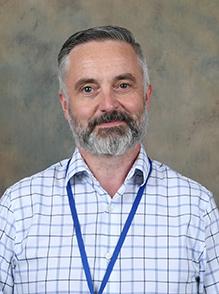
Research Topics
Parkinson's disease is one of the major age-related neurodegenerative disorders and is characterized by the progressive loss of neurons over time. Some of the major symptoms of Parkinson's relate to the ability of the patient to initiate or stop movement and these symptoms are related to loss of neurons that express the neurotransmitter dopamine in a region of the brain called the substantia nigra. One of the major mysteries about Parkinson's disease and other neurodegenerative disorders is that for most patients the root cause remains unidentified. However, in the last decade several rare families have been found where a disease is inherited whose symptoms overlap with typical Parkinson's disease. Our work is aimed at using this genetic information to understand the pathways involved that lead to neuronal damage and death.
Biography
Dr. Mark R. Cookson is a cell biologist whose current research interests include the effects of mutations in the genes associated with neurodegeneration at the cellular and molecular level. His laboratory efforts are directed at finding the underlying pathways that lead to Parkinson's disease and related disorders. Dr. Cookson received both his B.Sc. and Ph.D. degrees from the University of Salford, UK in 1991 and 1995, respectively. His postdoctoral studies included time spent at the Medical Research Council laboratories and at the University of Newcastle, Newcastle, UK. He joined the Mayo Clinic, Jacksonville, Florida, as an Assistant Professor in 2000 and moved to the NIA in February 2002. Within the Laboratory of Neurogenetics, Dr. Cookson's group works on the effects of mutations associated with Parkinson's disease on protein function.
Selected Publications
- Langston RG, Beilina A, Reed X, Kaganovich A, Singleton AB, Blauwendraat C, Gibbs JR, Cookson MR. Association of a common genetic variant with Parkinson's disease is mediated by microglia. Sci Transl Med. 2022;14(655):eabp8869.
- Bonet-Ponce L, Beilina A, Williamson CD, Lindberg E, Kluss JH, Saez-Atienzar S, Landeck N, Kumaran R, Mamais A, Bleck CKE, Li Y, Cookson MR. LRRK2 mediates tubulation and vesicle sorting from lysosomes. Sci Adv. 2020;6(46).
- Kluss JH, Mazza MC, Li Y, Manzoni C, Lewis PA, Cookson MR, Mamais A. Preclinical modeling of chronic inhibition of the Parkinson's disease associated kinase LRRK2 reveals altered function of the endolysosomal system in vivo. Mol Neurodegener. 2021;16(1):17.
- Mamais A, Kluss JH, Bonet-Ponce L, Landeck N, Langston RG, Smith N, Beilina A, Kaganovich A, Ghosh MC, Pellegrini L, Kumaran R, Papazoglou I, Heaton GR, Bandopadhyay R, Maio N, Kim C, LaVoie MJ, Gershlick DC, Cookson MR. Mutations in LRRK2 linked to Parkinson disease sequester Rab8a to damaged lysosomes and regulate transferrin-mediated iron uptake in microglia. PLoS Biol. 2021;19(12):e3001480.
- Beylina A, Langston RG, Rosen D, Reed X, Cookson MR. Generation of fourteen isogenic cell lines for Parkinson's disease-associated leucine-rich repeat kinase (LRRK2). Stem Cell Res. 2021;53:102354.
Related Scientific Focus Areas



Molecular Biology and Biochemistry
View additional Principal Investigators in Molecular Biology and Biochemistry


This page was last updated on Thursday, August 17, 2023